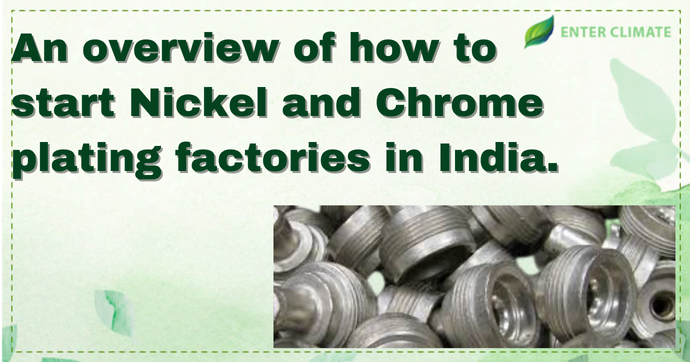An overview of how to start Nickel and Chrome plating factories in India.
 29 Nov, 2022
29 Nov, 2022 
There are several ways to impart corrosion resistance and metal finishing in the market today, with electroplating, anodising, passivation and electroless plating being a few popular techniques. However, electroplating using chromium and nickel have added advantages that many coating techniques don’t. Metals like chrome and nickel are deployed on metal surfaces to give them corrosion resistance and shining properties. Electroplating involves a chemical reaction between an anode (the plating material) and a cathode (the surface to be plated) suspended in a water-filled plating bath. A small amount of alkali or acid is added to improve the conductivity and the solution is passed with electricity to perform a redox reaction. The demand for nickel and chrome plating comes from industries like automotive, construction and hardware products, jewellery, tools and machine manufacturing etc. Rapid industrialisation and increasing disposable income of the Indian population are fuelling the demand for electroplate products, which in turn is boosting the need for nickel and chrome plating factories.
As per some reports, the global electroplating market will grow at 4.3% CAGR through 2030. A similar trend will be seen in India, where durable electroplated products have a huge demand. However, the nickel and chrome plating factories involved in electroplating must adhere to the pollution board’s standard operating procedures and waste management guidelines and follow the post-compliance mentioned in the pollution board certificate. Continue reading to find out how to start nickel and chrome plating factories in India.
Electroplating Industry in India
It is typical for most iron & steel materials to undergo a coating or plating process to slow down corrosion. Nickel and chrome plating are two of the most common plating processes used by industrial businesses due to their affordability and durability. Both processes are highly effective in adding protection and reinforcement to metal surfaces while providing a shiny finish. There are thousands of such small job-work nickel and chrome plating factories operating in India.
Benefits of starting nickel and chrome plating factories
While both nickel and chrome plating can be done in the same factory, their application varies on the type of product that needs plating. The following sections highlight the benefits of the two processes and the criteria for choosing a particular method depending on the surface and its utility.
Nickel Plating Business
The nickel plating process absorbs impurities from the surface of the metal and provides it with a uniform and lustrous layer of nickel. Nickel plating is widely utilised for its traditional looks and lower price than chrome plating. These two advantages have made nickel plating more common for industrial and residential purposes. There are two types of nickel plating, i.e. conventional plating and electroless plating. While the former is more affordable and provides higher corrosion resistance in the case of steel materials but it has certain limitations. It has a muted finish which tends to wear out or tarnish over time. However, electroless is just as corrosion-resistant and durable but has a nickel-phosphorus coating that leaves a sturdy texture and a glossier finish.
Chrome Plating Business
Chrome plating is usually chosen for its durability and customisable finish. Compared to nickel plating, chrome plating won’t corrode easily from steel surfaces, but it is more resistant to abrasion. Chrome plating is commonly seen on many automotive parts because of its gloss finish. Although it is generally more expensive than the nickel plating process, the popularity of chrome plating is growing among many customers due to its attention-grabbing, mirror-like appearance.
Licences and authorisation required to start nickel and chrome plating factories
The electroplating units are regulated under the Water (P&CP) Act 1974, the Air (P&CP) Act 1981[1] and the Hazardous Wastes Rules. The electroplating units are small-scale and often choose not to treat the waste generated intentionally or due to a lack of awareness. Most units perform crude plating practices, thereby generating large quantities of waste. For instance, chromium-bearing materials, solutions and waste streams generated after production requiring special handling are often discharged without proper treatment. Therefore, the government and Pollution control board keeps a regular check on such industries by mandating the following licences and authorisation.
Pollution NOC from SPCB/PCC: Nickel and chrome plating factories fall under the list of highly polluting industries and have been placed under the Red category of industry. Entrepreneurs must apply to their respective State Pollution Control Board/ Pollution Control Committee through the online consent management and monitoring System (OCMMS) for this licence. The documents required at this stage are
- List of names of addresses of directors and partners
- Layout Plan
- Schematic diagram of the operation
- Water consumption & Wastewater details
- land ownership documents
- Project Report from CA
- Consent fee
- Material safety data sheets
- List of plant & machinery installed by the unit.
- Pollution monitoring report for different sources of emission or trade effluents from State Board Laboratories recognised by MoEF / CPCB.
- Analysis report for noise level (if applicable)
- Copy of Clearance from NBWL (if applicable)
- Proof of compliance report in case of renewal
- DG Set Authorisation
- Effluent Treatment Plant
FactoryLicence
All nickel and chrome plating factories must get their premises registered with local authorities u/s 6 of the Factories Act, 1948. All applications for factories licence are scrutinised, and in case of any issue, the same is communicated to the applicant within a month. Documents required for obtaining a factory licence are –
- Filled application
- Application fees
- Existing building plan
- List of partners/directors and their residential address
- NOC from Partners or Board Resolution by Directors u/s 2(n) and 7 of the Factories Act, 1948
- Proof of occupier as proprietor, director or partner of the factory
- electricity connection proof(copy of electricity bill)
- Copy of rent agreement/ownership proof
- Flow chart of the manufacturing process
- List of raw materials used in electroplating
- List of machinery installed
Other Licences required by nickel and chrome plating factories
- Fire NOC
- Hazardous Waste Management Authorisation/ Tie-up with TSDF Operator.
- CGWA NOC (for the abstraction of water)
Conclusion
As the nickel and chrome plating factories generate wastewater with heavy metals, the unit has to necessarily obtain a pollution board certificate. Also, post compliance with respect to industrial waste discharge and annual and quarterly reporting mandated by CPCB are two additional responsibilities that a nickel and chrome electroplating unit should take care of timely. The rising demand for electroplated products from different end-use industries is attracting many entrepreneurs to the electroplating market. The electrical and electronics industry, which is a huge industry, also uses nickel and chrome-plated components for various end-use applications to improve characteristics such as corrosion resistance, wear resistance and electrical conductivity. Assistance and guidance in setting up nickel and chrome plating factories will not only provide entrepreneurs with a hassle-free operation of the unit in future but will also help them capture a more significant portion of this market.












